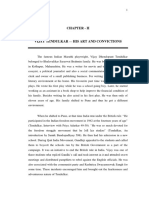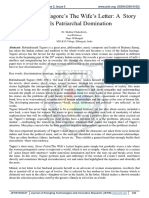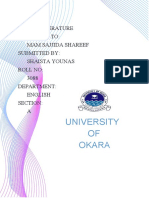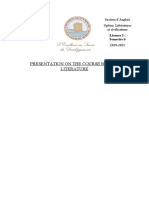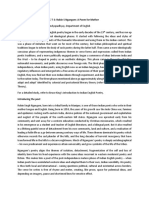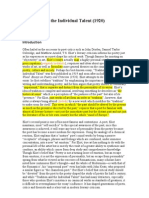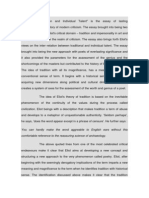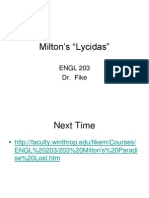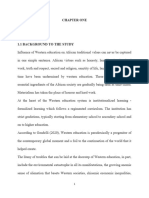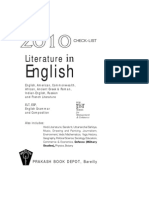Yeats, Eliot, and Modernism: A Sprint Thru Subtleties
Yeats, Eliot, and Modernism: A Sprint Thru Subtleties
Uploaded by
Rangothri Sreenivasa SubramanyamCopyright:
Available Formats
Yeats, Eliot, and Modernism: A Sprint Thru Subtleties
Yeats, Eliot, and Modernism: A Sprint Thru Subtleties
Uploaded by
Rangothri Sreenivasa SubramanyamOriginal Description:
Original Title
Copyright
Available Formats
Share this document
Did you find this document useful?
Is this content inappropriate?
Copyright:
Available Formats
Yeats, Eliot, and Modernism: A Sprint Thru Subtleties
Yeats, Eliot, and Modernism: A Sprint Thru Subtleties
Uploaded by
Rangothri Sreenivasa SubramanyamCopyright:
Available Formats
YEATS, ELIOT, AND MODERNISM
A SPRINT THRU SUBTLETIES
CHARACTERISTIC ATTITUDES & CONCERNS OF MODERNISM
Alienation from belief structures, social structures Resentment at Victorian mind-set Fragmentation & Loss Cynicism Sterility Rejection of genres, literary traditions Imagist narrative instead of dramatic monologue
ART AND FUSION
Poetry must be impersonal, that is, greater than and outside of the personality of the poet.
It is not the greatness, the intensity of the emotions, the components but the intensity of the artistic process, the pressureunder which the fusion takes place, that counts. T.S. Eliot, Tradition and the Individual Talent, 1219.
WILLIAM BUTLER YEATS 1865-1939
There is now overwhelming evidence that man stands between eternities, that of his family and that of his soul. I apply those beliefs to literature and politics and show the change they must make. . . . My belief must go into what I write, even if I estrange friends; some when they see my meaning set out in plain print will hate me for poems which they have thought meant nothing.
T.S. ELIOT 1888-1965
Language, especially the language of poetry, is a different matter. Poetry, it might seem, separates peoples instead of uniting them. But on the other hand we must remember, that while language constitutes a barrier, poetry itself gives us a reason for trying to overcome the barrier.
TWO CRUCIALLY IMPORTANT WORKS
The Second Coming: Most significant statement of early Modernism The Waste Land: Most significant statement of post-war Modernism, and one of the most influential literary works of the last century
MODERNIST VIEWS OF POETRY
Eliot, Tradition and the Individual Talent:
Poetry is not a turning loose of emotion but an escape from emotion; it is not the expression of personality, but an escape from personality. (1221) The emotion of art is impersonal. And the poet cannot reach this impersonalityunless he lives in what is not merely the present, but the present moment of the past, unless he is conscious, not of what is dead, but of what is already living. (1221)
WHAT ARE THEIR SOURCES OF ANXIETY?
For Yeats, constant tension of Irish history and tradition vs. modernism; the Irish Rebellion of 1916: All changed, changed utterly: A terrible beauty is born.enough to know they dreamed and are dead. For Eliot, WWI and the 20th century: the search for some kind of Grail, the displaced Countess, the reduction of love to something the typist does after dinner, etc.
WHERE DO WE SEE FRAGMENTATION AND LOSS?
The Second Coming: Things fall apart; the centre cannot hold; mere anarchy is loosed upon the world. Sailing to Byzantium: Whatever is begotten, born, and dies. The Wasteland: The husband and wife who can no longer communicate, Lil and her man, Tiresias the blind prophet: I can connect Nothing with nothing.
IN WHAT WAYS DO YEATS AND ELIOT DISCUSS ALIENATION?
No Second Troy: Why should I blame her. Why, what could she have done, being what she is? (Contrast with In Memoriam she is also a type.) Eliot: Typists inability to make human connections, blind Tiresias, the dry desert of section V; We think of the key, each in his prison / Thinking of the key, each confirms a prison
HOW DO THEY MAKE IT NEW?
Yeats: unrhymed iambic pentameter that is not blank verse, sonnets that are not sonnets (Leda and the Swan), Irish perspective
Eliot: Vers libre (free verse), allusions to anthropology, cultural mythologies, stream of conscious, deconstructing experience down to fragments of images (The Fire Sermon section of The Waste Land, for instance, or the last 10 lines of the poem)
HOW DO THEY MAKE IT DIFFERENT?
Yeats: Verse as an exacting instrument of introspection and national inquiry (p. 113).
Weaving mythology, history, mysticism, and politics into an intensely personal poetic.
Eliot: Monologues and soliloquies by characters previously unimagined in British literature; writing as outsider against British tradition yet within it (see Tradition and the Individual Talent); the anxiety of influence
HOW DO THEY MAKE IT HARD?
Yeats: Deliberate ambiguity, mythohistorical system of gyres, imagist poetry Eliot: Deliberate ambiguity, deconstructed and fragmented narrative, language changes, shifting points of view, stream of consciousness, pastiche of voices, images, cultural referents . Provides his own footnotes. Both argue that difficulty is importantthese questions dont have easy answers.
SENSE OF LOSS AND MOURNING
Yeats, Easter 1916: Too long a sacrifice can make a stone of the heart. O when may it sufficeWas it needless death after all?
Eliot: These fragments I have shored against my ruins; the Countess; Lils dialogue in the pub; Mr. Eugenides proposition
EPITAPH FOR THE MODERN PERIOD
You might also like
- Arms and The Man As An Anti-Romantic ComedyDocument2 pagesArms and The Man As An Anti-Romantic Comedygiridipak84No ratings yet
- The Immigrant's SongDocument2 pagesThe Immigrant's SongSwarupa LadNo ratings yet
- Gayathri Mantra in TeluguDocument18 pagesGayathri Mantra in Teluguramu0510100% (3)
- Attia Hosain S Sunlight On A Broken ColumnDocument9 pagesAttia Hosain S Sunlight On A Broken ColumnDeandra D'Cunha100% (1)
- "Sula" Is A Novel by A Nobel Prize-Winning Wordsmith Toni Morrison About A Youthful BlackDocument5 pages"Sula" Is A Novel by A Nobel Prize-Winning Wordsmith Toni Morrison About A Youthful BlackMADEINTHEEAST KeNo ratings yet
- Septimus Warren Smith As The Double of MDocument3 pagesSeptimus Warren Smith As The Double of MPriscila A. CustodioNo ratings yet
- Vi Desse LieDocument4 pagesVi Desse LieRahul KumarNo ratings yet
- Fundamentalism and Literature Kolatkar Zecchini-LibreDocument19 pagesFundamentalism and Literature Kolatkar Zecchini-LibrechaitalideNo ratings yet
- Chapter - IiDocument32 pagesChapter - IiKapil MilhotraNo ratings yet
- 06 - Chapter 3Document60 pages06 - Chapter 3funny videosNo ratings yet
- Sara Sulari Meatless DaysDocument4 pagesSara Sulari Meatless Daysazmat.pti.ikNo ratings yet
- the canadian authors meet - Google DocsDocument2 pagesthe canadian authors meet - Google DocsADITHYAN S SNo ratings yet
- Top Girls FeministDocument18 pagesTop Girls FeministKazuma SatoNo ratings yet
- Chapter 4 - Burn's AnalysisDocument3 pagesChapter 4 - Burn's AnalysisMiss_M9050% (2)
- Prose of The Age of PopeDocument1 pageProse of The Age of PopeTehneat Arshad0% (1)
- Conversations On World LiteratureDocument3 pagesConversations On World LiteratureIsabela FI100% (1)
- Women Writers PPT 2Document31 pagesWomen Writers PPT 2koomerisper2001No ratings yet
- Emancipation of Women in Tagore's The Wife's Letter: Dr. Sresha Yadav Nee GhoshDocument4 pagesEmancipation of Women in Tagore's The Wife's Letter: Dr. Sresha Yadav Nee GhoshSajal DasNo ratings yet
- Rabindranath Tagore's The Wife's Letter: A Story Reveals Patriarchal DominationDocument4 pagesRabindranath Tagore's The Wife's Letter: A Story Reveals Patriarchal DominationManoj JanaNo ratings yet
- About The Lowland PDFDocument18 pagesAbout The Lowland PDFShirley CarreiraNo ratings yet
- RemembranceDocument5 pagesRemembrancegingeeseedsNo ratings yet
- MA ENGLISH PreviousDocument25 pagesMA ENGLISH PreviousRadheShyam SharmaNo ratings yet
- Ecocritical Study of Girish Karnard's YayatiDocument5 pagesEcocritical Study of Girish Karnard's YayatiPratap Ratad100% (1)
- Writing fom the MarginsDocument5 pagesWriting fom the MarginsJohn StephenNo ratings yet
- Background To Hard TimesDocument13 pagesBackground To Hard TimesCecilia KennedyNo ratings yet
- Partition and Manto's WritingsDocument5 pagesPartition and Manto's WritingsAhsan AliNo ratings yet
- Church GoingDocument7 pagesChurch GoingHaroon AslamNo ratings yet
- An Essay On The Orientalism Found in Gulliver's Travels: by Jonathan SwiftDocument4 pagesAn Essay On The Orientalism Found in Gulliver's Travels: by Jonathan SwiftAndrei GheorgheNo ratings yet
- The Social NovelDocument14 pagesThe Social NovelElvis GonNo ratings yet
- CHAPTER 4 Thesis On Girish Karnad's PlayDocument60 pagesCHAPTER 4 Thesis On Girish Karnad's PlayAditya singhNo ratings yet
- 11 My Immigration Story - Tan Le QuestionsDocument3 pages11 My Immigration Story - Tan Le QuestionsMallika Nand NairNo ratings yet
- Sherman Alexie ArticleDocument17 pagesSherman Alexie ArticleemasumiyatNo ratings yet
- Voicing The Voiceless: Breast StoriesDocument24 pagesVoicing The Voiceless: Breast StoriesBhumika MahmudNo ratings yet
- Introduction About The PoetDocument3 pagesIntroduction About The PoetSr Chandrodaya JNo ratings yet
- Three Classes in Arnold's Culture and AnarchyDocument2 pagesThree Classes in Arnold's Culture and AnarchyZakaria DihajiNo ratings yet
- Shaista Younas 3088 EnglishDocument6 pagesShaista Younas 3088 EnglishZeeshan ch 'Hadi'No ratings yet
- Interrogating Identity, Ideology and Aesthetics: A Profile of Gujarati Dalit PoetryDocument3 pagesInterrogating Identity, Ideology and Aesthetics: A Profile of Gujarati Dalit PoetrySherrif Kakkuzhi-MaliakkalNo ratings yet
- Loyalty and Betrayal in Antony and Cleopatra by William ShakespeareDocument8 pagesLoyalty and Betrayal in Antony and Cleopatra by William ShakespeareDior NdiayeNo ratings yet
- Kamala Das PDFDocument1 pageKamala Das PDFnehalNo ratings yet
- AndhayugpostindependenceDocument1 pageAndhayugpostindependenceVaibhav MishraNo ratings yet
- English Literature in DepthDocument29 pagesEnglish Literature in DepthHimanshu BhaskarNo ratings yet
- Room of One's Own and CustodyDocument10 pagesRoom of One's Own and CustodyDushyant NimavatNo ratings yet
- No Second Troy Critical AnalysisDocument2 pagesNo Second Troy Critical AnalysisislamichidayattvNo ratings yet
- Themes of Waste LandDocument9 pagesThemes of Waste Landm14058103100% (1)
- Sir William BradshawDocument4 pagesSir William BradshawKingshuk MondalNo ratings yet
- ThemesDocument9 pagesThemesyousefsalman221100% (1)
- A Poem For A Mother AnalysisDocument3 pagesA Poem For A Mother AnalysisAVINo ratings yet
- 09 - Chapter 4 PDFDocument70 pages09 - Chapter 4 PDFujjwal kumarNo ratings yet
- Elements of Exile and Alienation in R. Parthasarathy's Poem: 'Trial'Document8 pagesElements of Exile and Alienation in R. Parthasarathy's Poem: 'Trial'anjuNo ratings yet
- Victimization As A Dominant Theme in The Playsilence The Court Is in Session by Vijay TendulkarDocument3 pagesVictimization As A Dominant Theme in The Playsilence The Court Is in Session by Vijay TendulkarInternational Journal of Innovative Science and Research TechnologyNo ratings yet
- Feminist Concerns in Mohammad Hanif's Our Lady of Alice BhattiDocument4 pagesFeminist Concerns in Mohammad Hanif's Our Lady of Alice Bhattiwisemove2050No ratings yet
- What Is Literature?: R.J. Rees, R.A. Scott-James, Terry Vargas LlosaDocument21 pagesWhat Is Literature?: R.J. Rees, R.A. Scott-James, Terry Vargas LlosaQhusnul AmaliaNo ratings yet
- Refugee Blues - Analytical Essay: W. H. AudenDocument1 pageRefugee Blues - Analytical Essay: W. H. AudenMohamad El MawlaNo ratings yet
- Ma Eng 2 Sems Note For Kala GhodaDocument10 pagesMa Eng 2 Sems Note For Kala GhodaRajat YadavNo ratings yet
- Feminist Re-Membering and Re-Visions - Vaidehis An AfternoonDocument23 pagesFeminist Re-Membering and Re-Visions - Vaidehis An AfternoonAnjanaSankarNo ratings yet
- Femininity Sports and FeminismDocument6 pagesFemininity Sports and FeminismBhadra GopanNo ratings yet
- Memory NotesDocument4 pagesMemory NotesDhritishna Jiri Pachani100% (1)
- RS Unit VI Paragraph Writing FinalDocument7 pagesRS Unit VI Paragraph Writing FinalRangothri Sreenivasa SubramanyamNo ratings yet
- Unit V Reading Comprehension FinalDocument14 pagesUnit V Reading Comprehension FinalRangothri Sreenivasa SubramanyamNo ratings yet
- Abraham Hicks QuotesDocument10 pagesAbraham Hicks QuotesKeyaraMalika100% (2)
- Kundalini Breathing ExerciseDocument2 pagesKundalini Breathing ExerciseAbdRdr63100% (4)
- Activating Vocaulary Through PicturesDocument25 pagesActivating Vocaulary Through PicturesRangothri Sreenivasa SubramanyamNo ratings yet
- Unit VI RS Letter Writing FinalDocument26 pagesUnit VI RS Letter Writing FinalRangothri Sreenivasa Subramanyam100% (1)
- Gita For AwakeningDocument300 pagesGita For AwakeningLokesh KhuranaNo ratings yet
- Adjective Clauses Review Ex Answer KeyDocument5 pagesAdjective Clauses Review Ex Answer KeyRangothri Sreenivasa SubramanyamNo ratings yet
- Ahankaar - Mimansha in HindiDocument243 pagesAhankaar - Mimansha in HindiRangothri Sreenivasa SubramanyamNo ratings yet
- Easier English Basic SynonymsDocument129 pagesEasier English Basic SynonymsRangothri Sreenivasa SubramanyamNo ratings yet
- Koumudi - Sramanakam TeluguDocument152 pagesKoumudi - Sramanakam TeluguRangothri Sreenivasa SubramanyamNo ratings yet
- ASHAMASHI (Telugu Kaburulu)Document122 pagesASHAMASHI (Telugu Kaburulu)Rangothri Sreenivasa SubramanyamNo ratings yet
- Rules of Concord or SubjectDocument3 pagesRules of Concord or SubjectRangothri Sreenivasa Subramanyam33% (3)
- The Directors - Take FourDocument241 pagesThe Directors - Take FourBogdan Theodor Olteanu100% (1)
- KOUMUDI - 2015 - HASYAVALLARI TeluguDocument51 pagesKOUMUDI - 2015 - HASYAVALLARI TeluguRangothri Sreenivasa Subramanyam100% (1)
- W3 U2 L12.Assertiveness 3 How To Say NoDocument11 pagesW3 U2 L12.Assertiveness 3 How To Say NoRangothri Sreenivasa Subramanyam100% (1)
- W3 U3 L13.Controlling Negative Emotions Managing AngerDocument13 pagesW3 U3 L13.Controlling Negative Emotions Managing AngerRangothri Sreenivasa SubramanyamNo ratings yet
- Tradition and The Individual TalentDocument8 pagesTradition and The Individual TalentmthgroupNo ratings yet
- Tradition and The Individual Talent EliotDocument6 pagesTradition and The Individual Talent EliotRia Roy ChoudhuryNo ratings yet
- Unit 2Document11 pagesUnit 2kirti vithaniNo ratings yet
- Tradition and The Individual TalentDocument5 pagesTradition and The Individual TalentJashim UddinNo ratings yet
- Versions of Heroism in Modern American Drama Redefinitions by Miller Williams O Neill and AndersonDocument185 pagesVersions of Heroism in Modern American Drama Redefinitions by Miller Williams O Neill and AndersonSedat Bay100% (2)
- T 5563 PDFDocument249 pagesT 5563 PDFAmritaBanerjee100% (1)
- Past Papers 2013 Punjab University MA Part 2 EnglishDocument4 pagesPast Papers 2013 Punjab University MA Part 2 EnglishNoor UlainNo ratings yet
- Tradition and The Individual Talent and The Waste LandDocument7 pagesTradition and The Individual Talent and The Waste LandGrey Periphery67% (3)
- Pgeg 5 8Document4 pagesPgeg 5 8diprobiswas9No ratings yet
- Tradition and Individual TalentDocument7 pagesTradition and Individual TalentOussama SahriNo ratings yet
- The Art of Marcel DuchampDocument10 pagesThe Art of Marcel DuchamppaubariNo ratings yet
- CRITICSDocument113 pagesCRITICSMarija DanilovicNo ratings yet
- T. S. Eliot's Aesthetics Péter EgriDocument31 pagesT. S. Eliot's Aesthetics Péter EgrisakunikaNo ratings yet
- T.S Eliot As A CriticDocument5 pagesT.S Eliot As A CriticSweet GuysNo ratings yet
- Enge 2390Document6 pagesEnge 2390Vincy YowNo ratings yet
- 203 Milton's LycidasDocument33 pages203 Milton's Lycidasalexsis_92No ratings yet
- Effective Communication A Strategy Tool For Achieving Organizational GoalDocument63 pagesEffective Communication A Strategy Tool For Achieving Organizational Goalbenjamin onumNo ratings yet
- Knjizevnost IVDocument352 pagesKnjizevnost IVMarija DanilovicNo ratings yet
- Tradition and The Individual TalentDocument13 pagesTradition and The Individual TalentDebopama DattaNo ratings yet
- Ese 4801Document7 pagesEse 4801Sharma UtkarshNo ratings yet
- English: Literary Criticism: Ancient To ModernDocument116 pagesEnglish: Literary Criticism: Ancient To ModernKavita MoriNo ratings yet
- S_W. H. Auden-A Modernist Poet.docDocument11 pagesS_W. H. Auden-A Modernist Poet.docizna noor mughalNo ratings yet
- Virginia Woolf, T.S. Eliot, and RealismDocument18 pagesVirginia Woolf, T.S. Eliot, and RealismJonathan SpaldingNo ratings yet
- T. S. Eliot-DanteDocument17 pagesT. S. Eliot-DanteПавле ЛучићNo ratings yet
- Full Download Modernism Sex and Gender Celia Marshik PDF DOCXDocument54 pagesFull Download Modernism Sex and Gender Celia Marshik PDF DOCXreinanovarsr100% (1)
- Knjizevnost IVDocument351 pagesKnjizevnost IVMarija DanilovicNo ratings yet
- PG SyllabusDocument924 pagesPG Syllabusven23No ratings yet
- Poetry BookDocument271 pagesPoetry BookGreenfall17No ratings yet
- Tradition and The Individual Talent SummaryDocument16 pagesTradition and The Individual Talent SummarybhavneeshNo ratings yet
- List of BooksDocument64 pagesList of Booksrahulbareilly67% (3)









